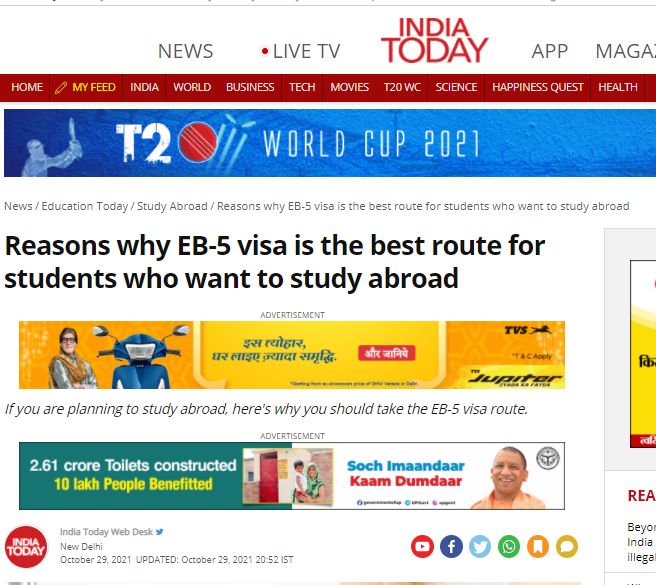Reasons why EB-5 visa is the best route for students who want to study abroad
Carrying hopes and dreams for a better tomorrow, students from across the globe aspire to learn at the world's most outstanding universities. This ambition is further driven by the want to work in geographies that offer their families a better quality of life.
Many people achieve this goal by relocating overseas to a country like the United States, where education and future work possibilities are limitless.
America houses some of the world's most prominent educational institutions like Yale, Brown, Harvard, Stanford, UC Berkley, and many more. State universities in the US are also renowned globally, and thus an education from any of them adds value to one's resume.
The visa problem for students now
Traditionally, students apply for an F1 visa for their education and then for an OPT and H1B when they look for employment in the United States.
However, the H-1B has come under increasing political pressure in recent years culminating in a temporary ban by President Trump last year.
Under the H-1B visa, it can be difficult to change employers or negotiate pay and conditions.
The EB-3 Visa which offers permanent residency to highly skilled professionals currently operates a multi-year waiting list for people born in India.
For those that can afford it, the EB-5 investor visa overcomes all these issues. By bestowing permanent residency (a Green Card), the EB-5 visa allows a person to live, work and study freely in the United States.
The minimum investment is currently set at $500,000 USD, which was reduced from $900,000 USD in June. That figure could rise again soon, so people are rushing to apply at the lower investment threshold.
A single EB-5 investment could include an entire qualifying family unit that is the primary applicant, a spouse, and any children under the age of 21.
It is important to consider an application well before a child reaches 21 because if they cross the age threshold during the processing period, they would require their own separate application with an accompanying investment.
There are a variety of reasons why students and parents choose EB-5 over other immigration routes.
Here are a few key reasons why EB-5 is preferred by many:
1. Possibility of lower tuition fees
International students with an EB-5 residency are subject to pay tuition lower than their immigrant peers for state universities.
If the family establishes their residence in the same state as the university, they could make the case that they are eligible for in-state tuition prices.
2. Access to financial aid and scholarships
At the time of application, many universities offer scholarships. International pupils compete for the limited number of scholarships available for students from across the globe.
However, with an EB-5 Green Card, students are eligible to apply for scholarships offered to us residents, thus increasing the probability of getting one.
State, Federal Government, and Schools also provide grants to students depending on need. These grants are not as widely available to international students but are accessible for EB-5 Green Card holders.
3. No employment restrictions during the course
As immigrants, students sometimes have to face restrictions such as allowance only for on-campus jobs and limited off-campus work opportunities during their education.
However, as an EB-5 Green card holder, international students aren't subject to such restrictions and can work freely off-campus like their American peers.
They can also avail themselves of useful work experience opportunities that could help with obtaining a job after graduation.
4. Improved job acquisition prospects after graduating
Perhaps one of the biggest advantages of EB-5 Visa is that it removes all the stresses of obtaining work authorization after graduation.
While the F-1 and OPT process are relatively straightforward, it becomes more difficult when seeking to remain in the US longer on the H-1B visa, for example.
The H-1B visa requires the employer to be willing to take on the extra administrative burden and is also subject to an annual lottery that resets at the start of the year.
Since the EB-5 Visa offers a Green Card, there are no restrictions on employment in the United States or for that matter on unemployment.
Green Card holders have the time to find a good job and negotiate a good salary, a luxury that non-Green Card holders do not have.
Securities Disclaimer
This website is for informational purposes only and does not constitute an offer or solicitation to sell shares or securities. Any such offer or solicitation will be made only by means of an investment's confidential Offering Memorandum and in accordance with the terms of all applicable securities and other laws. This website does not constitute or form part of, and should not be construed as, any offer for sale or subscription of, or any invitation to offer to buy or subscribe for, any securities, nor should it or any part of it form the basis of, or be relied on in any connection with, any contract or commitment whatsoever. EB5Projects.com LLC and its affiliates expressly disclaim any and all responsibility for any direct or consequential loss or damage of any kind whatsoever arising directly or indirectly from: (i) reliance on any information contained in the website, (ii) any error, omission or inaccuracy in any such information or (iii) any action resulting therefrom.




